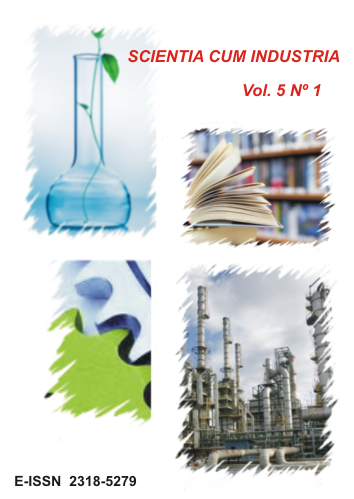Experimental Analysis of a Small Generator set Operating on Dual Fuel Diesel-Ethanol
DOI:
https://doi.org/10.18226/23185279.v5iss1p1Abstract
This work aims to analyze the operation of a generator set on single fuel mode with diesel oil, and on dual fuel mode using diesel–ethanol blends. The engine used to realize the experimental analysis was a diesel cycle model, single cylinder, direct injection, air refrigerated and coupled to a three-phase electric generator, whose set capacity was 8.0 kVA. The generated electric energy was dissipated in electrical resistances inside a reservoir with running water. Fuels were blended in different volumetric ratios, using a small portion of vegetable castor oil to promote the homogenization. The percentages of substitutions of diesel oil were by 10% to 50%, increasing by 10% the replacement for each sample. Also, the engine was operated with 100% substitution of diesel oil, i.e., for this condition, the samples were composed of ethanol/castor oil 90/10 (volume/volume), 80/20 and 75/25. The blends of diesel and ethanol did not obtain good performance, mainly in taxes of substitution above 40%, causing combustion failures, operational instability, and increase of fuel consumption, although it has achieved a greatly reduction on opacity percentages. The blends with 100% of substitution of diesel oil obtained good performance except to blend with 90% ethanol, where occurred combustion failures, which caused operational instability. To these conditions, the results achieved are increase of consumption by 17%, decrease of opacity by 79%, decrease of exhaust gas temperature by 3.5% and increase of engine thermal efficiency by 1.3%. At the ethanol – castor oil blends there was a decrease in the percentage of opacity by 96%, decrease of exhaust gas temperature by 17.6%, with a minimum of operational irregularities, although fuel consumption has increased by 52.4% and the engine thermal efficiency has decreased almost 1.7%.
References
M.T.O Pauferro. “Uso do etanol como combustível para motores diesel: uma discussão sobre a viabilidade”. Monografia (Especialização) - Curso de Gestão Ambiental, Instituto Mauá de Tecnologia, São Caetano do Sul, 2012.
V.B. Pedrozo; I. May; M.Dalla Nora; A. Cairns; H. Zaho. “Experimental analysis of ethanol dual-fuel combustion in a heavy-duty diesel engine: An optimisation at low load”. Applied Energy, v. 165, p.166-182, 2016.
P.S. de Caro; Z. Mouloungui; G. Vaitilingon; J.C. Berge. “Interest of combining an additive with diesel–ethanol blends for use in diesel engines” Fuel, v. 80, n. 4, p.565-574, 2001.
J.C.C. Egúsquiza. “Avaliação experimental de um motor ciclo diesel operando em modo bicomustível: diesel/etanol e diesel/gás. 168 p. PhD Thesis - Curso de Engenharia Mecânica, PUC-Rio, Rio de Janeiro, 2011.
E.G. Peralta; C.R.F Barbosa. “Características de desempenho de um motor diesel funcionando com mistura ternária de combustíveis diesel - álcool - óleo de rícino”. In: Proceedings of 16th BRAZILIAN CONGRESS OF MECHANICAL ENGINEERING, v. 4, p. 521 – 529, 2001.
Ö. Can; I. Çelikten; N. Usta. “Effects of ethanol addition on performance and emissions of a turbocharged indirect injection Diesel engine running at different injection pressures”. Energy Conversion And Management, v. 45, p. 2429-2440, 2004.
J.S. Estrada. “Desempenho e emissões de um motor de trator agrícola operando com misturas de óleo diesel e etanol”. 112 p. Master Dissertation - Curso de Engenharia Agrícola, Universidade Federal de Santa Maria, Santa Maria, 2015.
S. Kumar; J.H.Cho; J. Park; I. Moon. “Advances in diesel–alcohol blends and their effects on the performance and emissions of diesel engines”. Renewable And Sustainable Energy Reviews, v. 22, p.46-72, 2013.
A. Imran; M. Varman; H.H. Masjuki; M.A. Kalan. “Review on alcohol fumigation on diesel engine: A viable alternative dual fuel technology for satisfactory engine performance and reduction of environment concerning emission”. Renewable And Sustainable Energy Reviews, v. 26, p.739-751, 2013.
M. Abu-Qudais; O. Haddad; M. Qudaisat. “The effect of alcohol fumigation on diesel engine performance and emissions”. Energy Conversion & Management, v. 41, n. 4, p.389-399, 2000.
R.F. Britto Junior; C.A. Martins. “Experimental analysis of a diesel engine operating in Diesel–Ethanol Dual-Fuel mode”. Fuel, v. 134, p.140-150, 2014.
B.S. Chauhan; N. Kumar; S.S. Pal; Y.D. Jun. “Experimental studies on fumigation of ethanol in a small capacity Diesel engine”. Energy, v. 36, n. 2, p.1030-1038, 2011.
S.S. Ingle; V.M. Nandedkar. “Castor oil Biodiesel an alternative fuel for Diesel in compression ignition engine”. Journal of Mechanical and Civil Engineering (IOSR-JMCE) p. 10-13, 2013. Disponível em: www.iosrjournal.org. Acessado em: 08/01/2017.
R. Sattanathan. “Production of biodiesel from castor oil with its performance and emission test”. International Journal Of Science And Research, v. 4, n. 1, p.273-279, 2015. Disponível em : https://www.ijsr.net/archive/v4i1/SUB1533.pdf. Acesso em 09/01/2017.
T. Murayama; N. Miyamoto; T. Yamada; J.I. Kawashima. “A study on diesel engines with alcohol fuels (Engine performance with ethanol-castor oil fuel blends”. Journal of Japan Society of Mechanical Engineering, v26, no. 216, p. 1043-1049, 1983. Disponível em:
https://www.jstage.jst.go.jp/article/jsme1958/26/216/26_216_1043/_pdf.
Downloads
Published
How to Cite
Issue
Section
License
Copyright (c) 2017 Scientia cum Industria

This work is licensed under a Creative Commons Attribution 4.0 International License.
Declaração de originalidade e cessão de direitos autorais
Declaro que o presente artigo é original, não está sendo tendo sido submetido à publicação em qualquer outro periódico nacional ou internacional durante o processo de revisão. Através deste instrumento, em meu nome e em nome dos demais co-autores, porventura existentes, cedo os direitos autorais do referido artigo à revista SCIENTIA CUM INDUSTRIA. Contudo, a reprodução total ou parcial impressa ou eletrônica pode ser feita desde que o autor comunique oficialmente à revista. Declaro estar ciente de que a não observância deste compromisso submeterá o infrator a sanções e penas previstas na Lei de Proteção de Direitos Autorias. Declaro estar ciente de que a não observância deste compromisso submeterá o infrator a sanções e penas previstas na Lei de Proteção de Direitos Autorias (Nº9610, de 19/02/1998).





